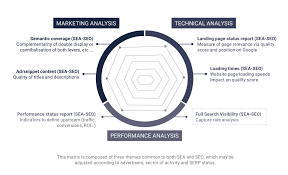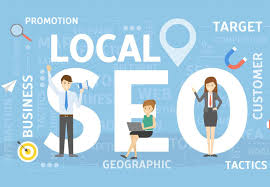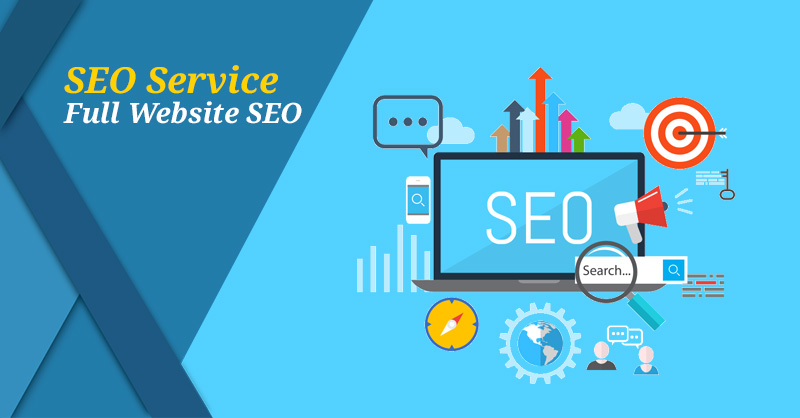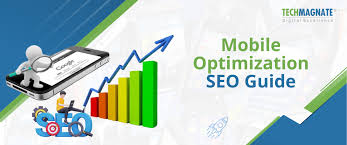Decoding SEO: A Comprehensive Definition of Search Engine Optimization
SEO Definition: Unveiling the Power of Search Engine Optimization
In today’s digital age, where online visibility can make or break a business, search engine optimization (SEO) has emerged as a critical tool for success. But what exactly is SEO, and why is it so important?
SEO, in its simplest form, refers to the practice of optimizing a website to improve its visibility and ranking on search engine results pages (SERPs). It involves various techniques and strategies that aim to enhance a website’s relevance and authority in the eyes of search engines like Google, Bing, and Yahoo.
The primary goal of SEO is to attract organic (non-paid) traffic to a website by increasing its visibility when users search for relevant keywords or phrases. By appearing higher in search results, websites have a greater chance of attracting clicks, driving more targeted traffic, and ultimately converting visitors into customers.
So why is SEO so crucial for businesses? Let’s delve deeper into its significance:
- Increased Online Visibility: With billions of searches conducted daily on search engines, having a strong online presence is essential. By optimizing your website for relevant keywords, you increase the chances of appearing prominently in search results. This heightened visibility allows you to reach a wider audience and attract potential customers who are actively searching for products or services like yours.
- Targeted Traffic: Unlike traditional advertising methods that cast a wide net hoping to catch some interested individuals, SEO allows you to target specific keywords or phrases related to your business niche. This means that the traffic driven to your website through SEO efforts is more likely to be genuinely interested in what you have to offer.
- Credibility and Trust: Appearing on the first page of search results instills confidence in users that your business is reputable and trustworthy. Users tend to associate higher rankings with authority and reliability, increasing the likelihood of them clicking through to your website.
- Cost-Effective Marketing: Compared to other marketing channels like paid advertising, SEO can offer a higher return on investment (ROI). While it requires an initial investment of time, effort, and possibly hiring professionals, the long-term benefits can be substantial. Once your website starts ranking well organically, the traffic generated is essentially free.
- Long-Term Results: SEO is not a quick fix; it’s an ongoing process that requires continuous optimization and adaptation to ever-changing search engine algorithms. However, the efforts put into SEO can yield long-lasting results. Unlike paid advertising campaigns that stop as soon as you stop investing in them, the organic traffic generated through SEO can persist even if you scale back your efforts.
In conclusion, search engine optimization (SEO) is a vital component of any successful online business strategy. It helps increase online visibility, attract targeted traffic, build credibility and trust with users, and offers a cost-effective marketing approach with long-term benefits.
To leverage the power of SEO effectively, it’s advisable to seek professional assistance or educate yourself on best practices. By adopting SEO strategies tailored to your business goals and staying up-to-date with industry trends, you can unlock the full potential of your website and thrive in the digital landscape.
7 Pros of SEO Definition in English (UK)
- Increased Organic Traffic
- Cost-Effective Marketing
- Improved User Experience
- Enhanced Brand Visibility and Credibility
- Targeted Audience Reach
- Long-Term Results
- Competitive Advantage
6 Cons of SEO Definition: Challenges Faced in the UK
- Time-Intensive Process
- Constant Algorithm Changes
- Competitive Landscape
- Uncertain Results
- Technical Expertise Required
- Limited Control Over Search Engines
Increased Organic Traffic
Increased Organic Traffic: The Power of SEO in Driving Targeted Visitors
In the vast digital landscape, where millions of websites compete for attention, attracting the right audience to your website is crucial. This is where search engine optimization (SEO) comes into play, offering a powerful solution to increase organic traffic.
One significant advantage of SEO is its ability to drive targeted visitors to your website. By optimizing your site’s content and structure, as well as implementing effective keyword strategies, you can improve its visibility on search engine results pages (SERPs). As a result, when users search for relevant keywords or phrases related to your business, your website has a higher chance of appearing prominently in their search results.
This increased visibility translates into more organic traffic. Unlike paid advertising methods that rely on reaching a broad audience and hoping for conversions, SEO enables you to attract visitors who are actively searching for products or services like yours. These individuals are already interested in what you have to offer, making them more likely to engage with your website and potentially convert into customers.
Moreover, the traffic generated through SEO is organic, meaning it is non-paid and driven by genuine interest rather than advertisements. This not only saves you money on costly advertising campaigns but also ensures that the visitors coming to your site are genuinely interested in what you have to offer. They are more likely to spend time exploring your website, interacting with your content, and ultimately taking desired actions such as making a purchase or filling out a contact form.
By consistently implementing effective SEO strategies and staying up-to-date with industry best practices, you can continue driving targeted organic traffic over time. Unlike temporary boosts from paid advertising campaigns that cease once the budget runs out, the benefits of SEO can be long-lasting. As your website climbs higher in search engine rankings for relevant keywords, it becomes an authoritative source that users trust and rely on when seeking information or solutions within your niche.
In conclusion, harnessing the power of SEO to increase organic traffic is a game-changer for businesses in the digital realm. By optimizing your website’s visibility and relevance on search engine results pages, you can attract targeted visitors who are actively searching for products or services like yours. This not only saves costs but also increases the likelihood of conversions and business growth. Embrace SEO as a vital tool in your online marketing arsenal and unlock the potential for sustainable success.
Cost-Effective Marketing
Cost-Effective Marketing: Unlocking the Potential of SEO
In an era where marketing budgets can quickly spiral out of control, businesses are constantly seeking cost-effective strategies that deliver tangible results. This is where search engine optimization (SEO) shines as a powerful marketing approach.
Compared to traditional advertising methods, SEO offers a cost-effective alternative that can yield significant long-term benefits. While it does require an initial investment of time and effort, the returns can be substantial.
One of the key advantages of SEO is that once your website starts ranking well organically, the traffic generated is essentially free. Unlike paid advertising campaigns that require continuous investment to maintain visibility, SEO allows you to attract organic (non-paid) traffic over time.
By optimizing your website for relevant keywords and providing valuable content, you increase its chances of appearing prominently in search engine results pages (SERPs). This heightened visibility drives targeted traffic to your website without incurring additional costs for each click or impression.
Moreover, unlike traditional advertising channels such as print media or television, where costs are often based on ad space or airtime, SEO does not have direct financial implications for every user interaction. This makes it particularly attractive for businesses operating on limited budgets or looking to maximize their return on investment (ROI).
Another cost-saving aspect of SEO is its long-term impact. While paid advertising campaigns may deliver immediate results, they often cease as soon as you stop investing in them. In contrast, the efforts put into optimizing your website for search engines can have lasting effects.
Once your website establishes a strong presence in search engine rankings through effective SEO practices, it becomes a sustainable source of organic traffic. This means that even if you scale back your ongoing efforts or pause optimization activities temporarily, your website will continue to attract visitors without additional expenditure.
Furthermore, with the continuous growth and reliance on digital platforms for information and commerce, investing in SEO can provide a higher ROI compared to traditional marketing channels. By targeting specific keywords and reaching users actively searching for products or services like yours, SEO ensures that your marketing efforts are focused on the right audience, maximizing the chances of conversion.
In conclusion, SEO offers a cost-effective marketing approach that can deliver substantial long-term benefits. By investing time and effort into optimizing your website for search engines, you can attract organic traffic without incurring additional costs per click or impression. This sustainable and targeted approach makes SEO an attractive option for businesses looking to make the most of their marketing budgets and achieve significant returns on investment.
Improved User Experience
Improved User Experience: Elevating Your Website’s Performance through SEO
One of the significant advantages of implementing search engine optimization (SEO) is the positive impact it has on user experience. SEO entails optimizing various aspects of your website, such as site structure, navigation, and page load speed. By enhancing these elements, you create a better user experience that not only pleases visitors but also contributes to improved search engine rankings.
A well-structured website with intuitive navigation makes it easier for users to find the information they seek. By organizing your content in a logical manner and providing clear menus and links, visitors can effortlessly navigate through your site, leading to increased engagement and longer browsing sessions. This enhanced user experience not only encourages users to explore more pages but also increases the chances of them converting into customers or taking desired actions.
Another crucial aspect of user experience is page load speed. In today’s fast-paced digital world, users expect websites to load quickly. Studies have shown that even a one-second delay in page load time can significantly impact bounce rates and user satisfaction. By optimizing your website’s performance, including reducing image sizes, leveraging caching techniques, and optimizing code, you can improve page load speed and reduce the likelihood of visitors leaving due to slow loading times.
When users have a positive experience on your website – finding what they need quickly, navigating seamlessly, and experiencing fast-loading pages – they are more likely to stay longer, engage with your content, and potentially convert into loyal customers. Moreover, search engines like Google consider user experience as an essential factor when determining search rankings. Websites that provide a superior user experience are more likely to rank higher in search results.
Incorporating SEO practices into your website not only boosts its visibility but also enhances the overall user experience. By optimizing site structure, navigation, and page load speed, you create a seamless journey for visitors that encourages them to stay longer on your site and engage with your content. This improved user experience not only increases the chances of conversion but also signals to search engines that your website is valuable and deserves higher rankings.
Investing in SEO to improve user experience is a win-win situation. Users have a better online experience, and businesses benefit from increased engagement, lower bounce rates, and improved search engine rankings. So, take the necessary steps to optimize your website for a seamless user experience, and watch as it translates into tangible benefits for your business.
Enhanced Brand Visibility and Credibility
Enhanced Brand Visibility and Credibility: Building Trust in the Digital Landscape
In the vast online marketplace, establishing a strong brand presence is essential for business success. One of the significant advantages of search engine optimization (SEO) is its ability to enhance brand visibility and credibility. When your website appears prominently in search results, it instills confidence in users, signaling that your business is reputable and trustworthy.
Higher rankings on search engine results pages (SERPs) are often associated with authority and reliability. Users tend to perceive businesses with top rankings as more established and trustworthy, which can have a significant impact on brand perception among potential customers.
By implementing effective SEO strategies tailored to your business, you can improve your website’s visibility for relevant keywords. This means that when users search for products or services related to your industry, your website will appear higher in the search results. This increased visibility not only attracts more organic traffic but also creates an impression of credibility and expertise.
When users see your website consistently appearing at the top of search results, they are more likely to view your brand as a reputable player in the market. This positive association builds trust and encourages users to click through to your website, increasing the chances of converting them into loyal customers.
Moreover, enhanced brand visibility through SEO can also lead to improved brand recognition. When users repeatedly encounter your brand while conducting searches or browsing online, it strengthens their familiarity with your business. This familiarity can contribute to increased brand recall and preference when they are ready to make a purchase decision.
It’s important to note that building brand visibility and credibility through SEO is not an overnight process. It requires consistent effort, optimization, and monitoring of search engine algorithms. However, by investing time and resources into SEO practices aligned with your business goals, you can establish a strong online presence that resonates positively with potential customers.
In conclusion, SEO plays a crucial role in enhancing brand visibility and credibility in the digital landscape. Appearing prominently in search results fosters trust and confidence among users, positively influencing their perception of your brand. By implementing effective SEO strategies, you can build a reputable online presence that sets your business apart from competitors and drives sustained success.
Targeted Audience Reach
Targeted Audience Reach: Unlocking the Power of SEO
In the vast digital landscape, where countless websites compete for attention, reaching the right audience is crucial for business success. This is where search engine optimization (SEO) shines, offering a powerful advantage by enabling targeted audience reach.
SEO allows businesses to strategically optimize their websites for specific keywords or phrases related to their niche. By doing so, they increase their chances of appearing prominently in search engine results when users actively search for those keywords. This targeted approach ensures that the traffic driven to their website through SEO efforts consists of individuals genuinely interested in what they have to offer.
The significance of this cannot be overstated. When your website attracts visitors who are actively seeking products or services related to your business, you have a higher likelihood of converting them into customers. These individuals are already primed and motivated, making them more receptive to your offerings.
By aligning your SEO strategy with your business objectives and understanding your target audience’s search behavior, you can optimize your website effectively. This involves conducting thorough keyword research and incorporating those keywords naturally into your website’s content, meta tags, headings, and other relevant elements.
The beauty of targeted audience reach through SEO lies in its ability to attract quality traffic. Instead of relying on generic advertising methods that may cast a wide net but yield uncertain results, SEO focuses on connecting with people who are actively seeking what you provide. This not only increases the chances of conversions but also enhances user experience as they find exactly what they were searching for.
Moreover, targeting specific keywords or phrases enables businesses to position themselves as experts in their respective niches. When users consistently find valuable and relevant content on your website through organic searches, it builds trust and credibility. This can lead to increased brand recognition and customer loyalty over time.
To fully leverage the power of targeted audience reach through SEO, it is essential to stay updated with industry trends and adapt your strategies accordingly. Search engine algorithms evolve, user search behavior shifts, and new keywords emerge. By continuously monitoring and optimizing your SEO efforts, you can maintain a competitive edge and ensure that you are effectively reaching your target audience.
In conclusion, targeted audience reach is a significant pro of SEO. By strategically optimizing your website for specific keywords or phrases related to your business niche, you can attract individuals who are genuinely interested in what you have to offer. This results in higher conversion rates, enhanced credibility, and long-term success in the digital realm. Embrace the power of SEO and unlock the potential of reaching the right audience for your business.
Long-Term Results
The Power of Long-Term Results with SEO
In the fast-paced world of digital marketing, businesses are constantly seeking strategies that provide sustainable results. This is where search engine optimization (SEO) truly shines. One of the key advantages of SEO is its ability to deliver long-term results that persist even when efforts are scaled back.
Unlike paid advertising campaigns, which require continuous investment to maintain visibility, SEO focuses on organic traffic generated through optimizing your website for search engines. While it does require ongoing effort to adapt to changing algorithms and stay ahead of the competition, the rewards can be substantial.
Once your website starts ranking well organically, it can continue to attract visitors even if you reduce your SEO efforts. This is because search engines recognize the credibility and relevance of your website, allowing it to maintain its position in search results. As a result, you can enjoy a steady stream of organic traffic without relying solely on paid advertising.
The long-term benefits of SEO extend beyond cost-effectiveness. By investing in optimizing your website for relevant keywords and providing valuable content, you build a solid foundation for sustained success. Users who discover your website through organic search results tend to have higher trust in your brand and are more likely to engage with your business.
Additionally, as you continue to optimize your website over time, it becomes an authoritative resource within your industry. Search engines value websites that consistently provide valuable content and reward them with higher rankings. This increased visibility not only drives more traffic but also positions you as an industry leader, further enhancing brand reputation and credibility.
It’s important to note that achieving long-term results with SEO requires dedication and staying up-to-date with evolving best practices. Regularly monitoring performance metrics and making necessary adjustments will help ensure continued success.
In conclusion, one of the greatest advantages of SEO is its ability to generate long-lasting results. By investing in optimizing your website for search engines and providing valuable content, you can attract organic traffic that persists even when you scale back your efforts. This sustainable approach not only saves costs but also builds credibility, authority, and trust with your target audience. Embrace the power of SEO, and unlock the potential for long-term growth in the digital landscape.
Competitive Advantage
Competitive Advantage: Unleashing the Power of SEO
In the ever-evolving digital world, competition is fierce. Businesses are constantly vying for attention and striving to stand out from the crowd. This is where search engine optimization (SEO) becomes a game-changer, offering a significant competitive advantage.
One of the key benefits of a strong SEO strategy is the ability to outrank competitors on search engine results pages (SERPs). By optimizing your website effectively, you increase your chances of appearing higher in search rankings, making it more likely that potential customers will come across your business before considering alternatives.
Here’s how this competitive advantage plays out:
- Increased Visibility: When users search for products or services related to your industry, appearing at the top of SERPs gives you prime visibility. By outranking competitors, you capture the attention of potential customers at a crucial stage in their decision-making process. Being visible before your competitors means you have a greater chance of attracting their interest and consideration.
- Brand Authority: Higher rankings on SERPs not only attract more clicks but also build brand authority and credibility. When users consistently see your website listed above competitors’, it reinforces the perception that your business is trustworthy and reliable. This can lead to increased brand recognition and customer loyalty, giving you an edge in a crowded market.
- Targeted Traffic: SEO allows you to target specific keywords or phrases that align with your business offerings. By optimizing for these relevant terms, you attract highly targeted traffic to your website – people actively searching for what you have to offer. This means that the visitors who land on your site are more likely to convert into paying customers compared to those who stumble upon it by chance.
- Long-Term Impact: Investing in SEO is not just about short-term gains; it’s about building a sustainable competitive advantage over time. While it may take some effort and time to climb up the rankings initially, once you establish a strong SEO foundation, it becomes easier to maintain and improve your position. This consistency gives you an ongoing edge over competitors who may not be prioritizing SEO.
In today’s digital landscape, where consumers turn to search engines for answers and solutions, having a robust SEO strategy is no longer optional – it’s essential. By leveraging the power of SEO, you gain a competitive advantage by outranking competitors on SERPs, increasing visibility, establishing brand authority, attracting targeted traffic, and securing long-term success in the online marketplace.
Stay ahead of the competition by embracing SEO as a core component of your digital marketing efforts. Partner with experts or invest in learning best practices to unlock the full potential of this invaluable tool and propel your business towards sustained growth and success.
Time-Intensive Process
Time-Intensive Process: The Challenge of Investing in SEO
In the ever-evolving digital landscape, search engine optimization (SEO) has become a necessity for businesses seeking online success. However, it’s essential to acknowledge one significant con of SEO: its time-intensive nature.
Implementing and maintaining effective SEO strategies demands a considerable investment of time and effort. From conducting thorough keyword research to optimizing website content and building authoritative backlinks, every step requires meticulous attention to detail. This process can be particularly challenging for businesses with limited resources or expertise in the field.
One of the primary reasons SEO is time-consuming is its dynamic nature. Search engines continually update their algorithms to enhance user experience and deliver more relevant results. As a result, businesses must stay up-to-date with these changes, adapt their strategies accordingly, and continuously monitor their website’s performance.
Keyword research alone can be a lengthy process. Identifying the most relevant and valuable keywords for your business involves analyzing search volume, competition levels, and user intent. It requires comprehensive research and analysis to uncover the keywords that will drive targeted traffic to your website.
Content optimization is another time-intensive aspect of SEO. Crafting high-quality content that incorporates relevant keywords while providing value to users is crucial for search engine visibility. This includes optimizing meta tags, headings, alt tags, and ensuring proper keyword density throughout the content.
Building authoritative backlinks is yet another time-consuming task in SEO. Acquiring high-quality links from reputable websites helps establish credibility and boosts organic rankings. However, building these relationships takes time as it involves outreach efforts, relationship building, and earning links through valuable content creation.
For businesses with limited resources or expertise in SEO, allocating sufficient time and manpower can be challenging. It may require hiring dedicated professionals or outsourcing to reputable agencies specializing in search engine optimization.
Despite its time-intensiveness, it’s important not to overlook the long-term benefits that effective SEO can provide. While it may take months to see significant results, the organic traffic generated through SEO efforts can have a lasting impact on a business’s online visibility and success.
In conclusion, the time-intensive nature of SEO is an undeniable con that businesses must consider. It requires significant investment in terms of time, effort, and possibly financial resources. However, by recognizing this challenge and allocating resources appropriately, businesses can navigate the SEO landscape effectively and reap the rewards of improved online visibility and targeted traffic.
Constant Algorithm Changes
The Con of SEO: Constant Algorithm Changes
Search engine optimization (SEO) is undoubtedly a powerful tool for businesses seeking online success. However, one significant challenge that comes with SEO is the constant algorithm changes implemented by search engines.
Search engines like Google are continuously refining their algorithms to ensure users receive the most relevant and high-quality search results. While these updates are intended to enhance the user experience, they can have a significant impact on website rankings.
For businesses relying on SEO to drive organic traffic, staying on top of these algorithm changes is crucial. However, it can be an arduous task for those without dedicated SEO professionals or the necessary expertise.
When search engine algorithms change, websites that were once ranking well may suddenly find themselves pushed down in search results. This can lead to a decline in organic traffic and potentially impact business growth.
Adapting SEO strategies to align with new algorithms requires constant monitoring and adjustment. It involves understanding the latest trends, best practices, and algorithmic updates. For businesses already juggling multiple responsibilities, keeping up with these changes can be overwhelming and time-consuming.
To overcome this con of SEO, it is essential for businesses to consider investing in dedicated SEO professionals or partnering with experienced digital marketing agencies. These experts stay abreast of algorithm changes and possess the knowledge and skills needed to adapt strategies accordingly.
By entrusting SEO management to professionals, businesses can focus on their core operations while ensuring their online presence remains optimized for search engine rankings. This allows them to navigate algorithmic shifts effectively and maintain a competitive edge in the digital landscape.
In conclusion, while SEO offers numerous benefits, it’s important to acknowledge the challenge posed by constant algorithm changes. Businesses must recognize the need for ongoing adaptation and consider seeking expert assistance to navigate these complexities successfully. By doing so, they can mitigate the impact of algorithmic updates and continue harnessing the power of SEO for sustainable online growth.
Competitive Landscape
Competitive Landscape: The Challenge of Standing Out in SEO
In the ever-evolving world of search engine optimization (SEO), one con that businesses often face is the highly competitive landscape. As the popularity of SEO continues to soar, the race to secure top rankings on search engine results pages (SERPs) has become increasingly fierce. This poses a significant challenge, particularly for smaller businesses or those operating in highly competitive industries.
In an ideal scenario, implementing effective SEO strategies would guarantee improved visibility and increased organic traffic. However, with numerous websites vying for attention using similar techniques, it can be daunting for businesses to outrank their established competitors who have already invested heavily in their SEO efforts.
For smaller businesses with limited resources, competing against larger enterprises with dedicated SEO teams and substantial budgets can seem like an uphill battle. These established competitors may have been optimizing their websites for years, accumulating backlinks, producing high-quality content, and fine-tuning their on-page optimization. Breaking through this barrier requires careful planning, persistence, and a comprehensive understanding of your target audience.
To overcome this con of the competitive landscape in SEO, smaller businesses need to adopt a strategic approach:
- Niche Targeting: Instead of trying to compete directly with larger competitors on broad keywords or phrases, focus on niche targeting. Identify specific keywords or long-tail phrases that align closely with your business offerings and cater to a more targeted audience. By honing in on a specific niche, you can carve out your own space and attract relevant traffic that is more likely to convert into customers.
- Quality Content: Producing high-quality content remains crucial in standing out from the competition. Create valuable and engaging content that addresses the pain points and interests of your target audience. By offering unique perspectives or insights within your industry, you can establish yourself as an authoritative voice and attract organic backlinks from other reputable websites.
- Local SEO: For businesses operating within specific geographical areas, leveraging local SEO strategies can be advantageous. Optimize your website for location-based keywords and ensure your business information is consistent across online directories and platforms. This can help you rank higher in local search results, where competition may be less intense compared to broader keywords.
- User Experience: Enhancing the user experience on your website is vital for both search engines and visitors. Ensure your website is mobile-friendly, loads quickly, and provides a seamless browsing experience. By prioritizing user satisfaction, you can improve your chances of retaining visitors and encouraging them to engage with your content or make a purchase.
While the competitive landscape in SEO presents challenges, it’s important to remember that success is not solely dependent on outranking competitors. By focusing on delivering value to your target audience, building strong relationships with customers, and continuously optimizing your SEO strategies, you can carve out a unique space for your business in the digital realm.
In summary, while competition in SEO can be fierce, smaller businesses can still thrive by adopting niche targeting, producing quality content, leveraging local SEO tactics, and prioritizing user experience. By embracing these strategies alongside a comprehensive SEO approach tailored to their specific goals and resources, businesses can overcome the challenges of the competitive landscape and achieve long-term success online.
Uncertain Results
Uncertain Results: The Challenge of SEO’s Ever-changing Landscape
In the realm of search engine optimization (SEO), one con that businesses must contend with is the uncertainty of results. While SEO is a powerful tool for increasing online visibility and driving organic traffic, there are no guarantees of immediate or consistent outcomes.
Despite diligently implementing best practices, businesses may find their rankings fluctuating due to various factors. Competition within their industry, algorithm updates by search engines, or shifts in user behavior can all influence search engine rankings. This unpredictability can pose challenges for businesses that heavily rely on organic traffic from search engines.
One of the main reasons for this uncertainty is the ever-changing nature of SEO. Search engines continuously refine and update their algorithms to deliver more relevant and accurate search results to users. These algorithm updates can have a significant impact on website rankings, sometimes causing fluctuations even for well-optimized sites.
Additionally, as competition in the digital landscape intensifies, businesses are constantly vying for top positions in search results. This increased competition means that maintaining a consistent ranking requires ongoing efforts and adaptation to stay ahead.
Another factor contributing to uncertain results is changes in user behavior. Users’ preferences and search habits evolve over time, influenced by factors such as technological advancements and shifting trends. These changes can alter the way people search for information online and impact how websites are ranked.
While uncertain results may seem discouraging, it’s crucial to remember that SEO remains an essential component of a comprehensive digital marketing strategy. Despite its challenges, SEO still offers numerous benefits such as increased visibility, targeted traffic, and long-term ROI.
To mitigate the uncertainty associated with SEO, businesses can adopt a multifaceted approach to their online presence. Diversifying marketing channels beyond organic traffic from search engines can help create a more stable foundation for success. Incorporating paid advertising campaigns or leveraging social media platforms can complement SEO efforts and provide alternative sources of traffic.
Moreover, staying informed and adaptable is key in navigating the ever-changing SEO landscape. Keeping up with industry trends, monitoring algorithm updates, and regularly auditing and optimizing your website can help mitigate the impact of uncertain results.
In conclusion, while uncertain results are a con of SEO, businesses can overcome this challenge by diversifying their digital marketing efforts and staying proactive. By understanding the dynamic nature of SEO and adapting strategies accordingly, businesses can maximize their chances of success in the competitive online landscape.
Technical Expertise Required
The Con of SEO Definition: Technical Expertise Required
In the realm of search engine optimization (SEO), where businesses strive to improve their online visibility, there is a con that cannot be overlooked: the need for technical expertise. While basic SEO techniques are accessible to beginners, advanced optimization often demands a deeper understanding of website structure, coding languages, and server configurations. This can pose a challenge for business owners and marketers who lack these skills or do not have the resources to hire specialized personnel.
SEO encompasses various technical aspects that go beyond keyword research and content optimization. It involves optimizing website architecture, ensuring proper URL structures, implementing structured data markup, improving page load speed, and addressing technical issues like broken links or duplicate content. These tasks require a level of technical proficiency that may be beyond the scope of some individuals or small businesses.
Without the necessary technical expertise, attempting complex SEO tasks can lead to mistakes or suboptimal results. Improperly implemented techniques can negatively impact website performance and user experience. Moreover, search engines like Google consider technical factors when ranking websites, so overlooking them can hinder your chances of achieving higher rankings.
For business owners and marketers facing this con, there are a few options to consider:
- Invest in education: While becoming an expert overnight is unrealistic, investing time in learning foundational SEO principles can go a long way. There are numerous online resources and courses available that can help individuals gain a better understanding of technical SEO aspects.
- Seek professional assistance: If time constraints or lack of interest prevent you from delving into the intricacies of technical SEO, hiring an experienced professional or agency might be the best solution. These experts possess the required knowledge and skills to handle complex optimization tasks effectively.
- Collaborate with web developers: If you have access to web development resources within your organization or have a trusted developer at your disposal, collaborating with them can bridge the gap between SEO requirements and technical implementation. By working together, you can ensure that SEO best practices are seamlessly integrated into your website.
While technical expertise is indeed a con when it comes to SEO, it is essential to remember that not all aspects of optimization require advanced technical knowledge. By focusing on the fundamentals and seeking assistance when needed, businesses can still make significant progress in improving their online visibility and attracting organic traffic.
In conclusion, while technical expertise is a hurdle for some business owners and marketers in the realm of SEO, there are ways to overcome this challenge. Whether through personal education, professional assistance, or collaboration with web developers, businesses can navigate the technical complexities of SEO and unlock its benefits in the competitive digital landscape.
Limited Control Over Search Engines
Limited Control Over Search Engines: The Challenge of SEO
Search engine optimization (SEO) is undoubtedly a powerful tool for enhancing online visibility and attracting organic traffic. However, it’s important to acknowledge one significant con: the limited control that website owners have over search engines themselves.
Search engines like Google, Bing, and Yahoo employ complex algorithms to determine how websites are ranked in search results. These algorithms consider numerous factors such as relevance, authority, user experience, and more. Unfortunately, the exact details of these algorithms are closely guarded secrets.
This lack of transparency poses a challenge for website owners and SEO practitioners alike. Despite implementing well-optimized strategies and adhering to best practices, there is no guarantee of achieving desired rankings. Factors beyond their control can impact search engine rankings, making it difficult to predict or influence outcomes.
For instance, search engines regularly update their algorithms to improve user experience and combat spammy practices. While these updates aim to provide more accurate and relevant results for users, they can also cause fluctuations in website rankings. Even well-optimized websites may experience sudden drops or shifts in visibility due to algorithmic changes.
Moreover, search engines have the final say on how websites are displayed in search results. They decide which snippets of content are shown, which meta descriptions are used, and even when rich features like knowledge panels or featured snippets appear. Website owners have limited control over these aspects and must rely on search engine discretion.
Another aspect that affects control is competition. In highly competitive industries or markets with numerous established players, it can be challenging for new or smaller websites to outrank their competitors with stronger online presence and authority. Despite employing effective SEO strategies, the sheer competitiveness of certain niches can limit the attainable rankings.
To navigate this con effectively requires a balanced approach. While website owners cannot directly control search engine algorithms or guarantee specific rankings, they can focus on what they do have control over:
- Quality Content: Creating valuable, relevant, and engaging content that resonates with users can improve the chances of attracting organic traffic and earning backlinks from other reputable websites.
- On-Page Optimization: Optimizing website elements such as meta tags, headings, URLs, and internal linking structure can enhance the overall user experience and signal relevance to search engines.
- Technical SEO: Ensuring that the website is technically sound, fast-loading, mobile-friendly, and accessible to search engine crawlers can positively impact rankings.
- Building Authority: Earning high-quality backlinks from authoritative websites within the industry can boost a website’s credibility and authority in the eyes of search engines.
While limited control over search engines is a con of SEO, it’s essential to focus on what can be influenced rather than dwelling on uncontrollable factors. By adopting a holistic approach to SEO and continuously adapting strategies based on industry trends and user preferences, website owners can maximize their chances of achieving desired rankings while embracing the ever-evolving nature of search engine algorithms.










Leave a Comment